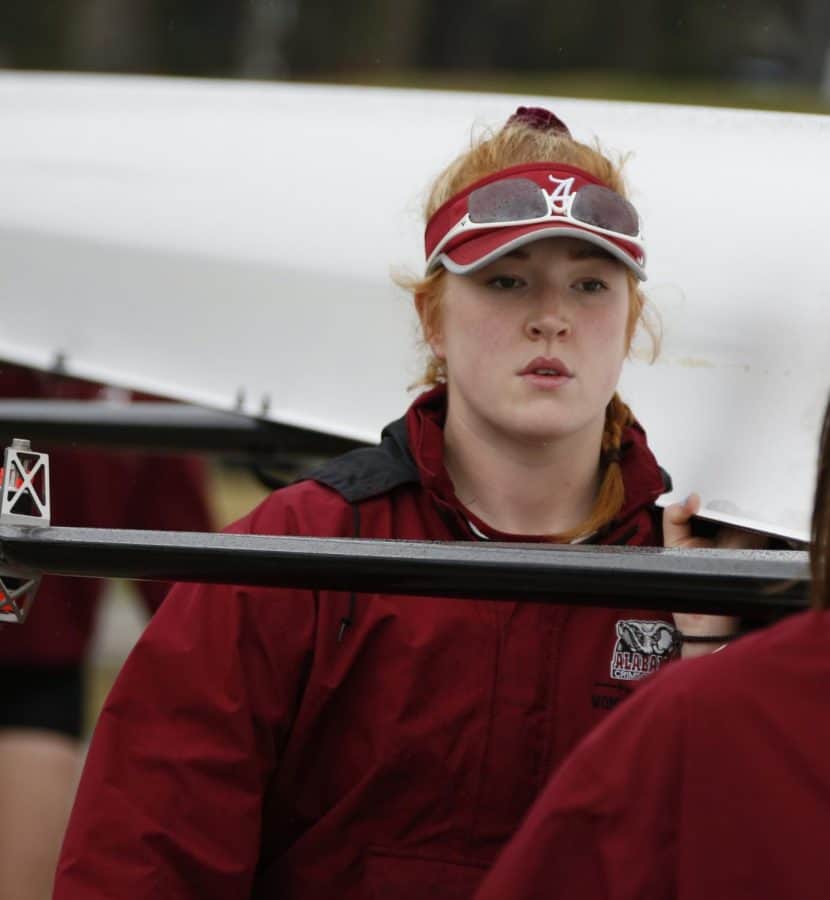MacRae overcomes illness, looks to thrive in junior season
October 7, 2019
A New Zealand native, Jorja MacRae was dedicated to becoming a collegiate rower in the United States.
During her senior year of high school in 2016, MacRae’s training hit a speedbump. Although she was training harder than she ever had, her performances on the water were not getting better, and she was not getting faster. As the rowing season progressed, she began to feel worse.
“For the amount of training I was doing, I should have been getting faster,” MacRae said. “I continued rowing for the next couple months until the end of the season regatta, the Aon Maadi Cup. This regatta was the final straw for me knowing something wasn’t right with my body.”
In the penultimate race, she underperformed and was more exhausted than usual.
MacRae soon learned she had mononucleosis. Often called “mono,” mononucleosis is a virus that causes extreme fatigue, among other symptoms, and is common among teenagers.
“They didn’t know when exactly I got it,” MacRae said. “From that point on, my mono only got worse. I went from training 10 times a week to sleeping about 16 hours a day, and the rest of the day was spent on the couch watching TV.”
Since she was not training or competing, the chances of MacRae being recruited went from high to low. It was a high-risk, high-reward situation for colleges recruiting her, including Alabama.
Alabama decided to roll the dice, and MacRae committed to the Crimson Tide.
By the time she made her way to Tuscaloosa, MacRae had recovered from mono. She was herself again. But, her freshman season provided more obstacles that she had to overcome.
“When I arrived here, I thought that I would be back to my normal self – I would get my fitness back quickly, and I would be able to make one of the top boats, but that did not happen,” MacRae said. “I ended up making the Novice 8, which is not a conference boat and does not travel with the team. I was lucky enough to be one of the spare rowers for if someone got hurt that got to travel with the team, but we never got to race.”
MacRae’s freshman year didn’t go the way she planned. She faced challenges, all of which she conquered, and it gave her the motivation to become the rower she wanted to be.
After her freshman season ended, MacRae went back to New Zealand and used her struggles in Alabama as motivation to train so that she could come back stronger and in better shape. Under first-year head coach Glenn Putyrae, she quickly made progress.
During her sophomore year, she was a part of the top 16 that traveled to Oklahoma at the beginning of the season and was named to the Varsity 8 during the Head of the Hooch regatta. She also became Alabama’s first All-American.
Alabama swept a top-20 team, landed in the top 20 of the U.S. Rowing/CRCA’s Poll and finished second at Conference Championships – all firsts for the program. Alabama also won three straight Big 12 Boat of the Week honors, tying the longest streak in Big 12 rowing history. The last team to win three consecutive weekly awards was Texas in 2017.
This season, Putyrae, now in his second year, is looking to take Alabama to new heights, not just in the Big 12, but nationally.
“We want to do better than we did last year,” Putyrae said. “We had a few wins but had a lot of fourth and fifth place finishes, so our goal is to build off that and get better.”
The Crimson Tide starts its season this weekend at the Head of the Oklahoma regatta in Oklahoma City. After that, the team competes in Head of the Hooch in Chattanooga in November. Despite having 18 seniors, the rowing team is relatively young. And, because of that, the team started a leadership council. Feeding off of last year’s success, the council will provide that backbone to make sure the progress continues.
For MacRae, the hardest part is behind her. The mental aspect of overcoming mono is in the past, and the preparation to have success in the future is at the forefront. The success of MacRae not only comes from her hard work, but it comes from her teammates. And that is what the Crimson Tide needs.
“I think her success has helped other girls on the team and so they want that success as well,” Putyrae said.





















![NEWS | The University provided the UA Young Americans for Freedom chapter an exception to a required non-discrimination clause for student organization constitutions that prohibits barring membership based on characteristics of personal identity.
The exception for the conservative political organization allows it to use a modified version of the required non-discrimination statement excluding wording prohibiting discrimination based on a student’s “gender identity, gender expression, [or] sexual identity.”
“We were not about to be bullied by this new gender ideology cult infecting the University of Alabama administration,” Trenton Buffenbarger, president of UA YAF, said in an article on the YAF website.
After UA YAF applied to renew its organization with The Source, an annual requirement for student organizations, the Source rejected the application. A University employee stated in an email reply to UA YAF that it was required to include a nondiscrimination clause in its constitution with the “EXACT” wording, noting that UA YAF would remain in “frozen status” until it complied.
The chapter pushed back against this required clause, as it included references to gender identity and sexual identity.
Buffenbarger said in an interview with The Crimson White that he saw this as an attack on “basic free-thinking students,” adding he believes that welcoming in someone who not only fundamentally disagrees with the organization on “ideology,” but encourages the opposing ideology, is wrong.
“UA tried to force us to not only comply, but to explicitly put something we disagree with in writing in our constitution,” Buffenbarger said. “It is a violation of the First Amendment.”
📸 CW / Riley Thompson
🖊️ CW / Cameron Cortez
Read the full story at the link in our bio.
#theuniversityofalabama #universityofalabama #alabama #uofa #ua #crimsontide #rolltide #tuscaloosa #tuscaloosaalabama #alabama #bama](https://scontent-ord5-2.cdninstagram.com/v/t51.75761-15/482193306_18487676404025566_4501943912441479788_n.jpg?stp=dst-jpg_e35_tt6&_nc_cat=102&ccb=1-7&_nc_sid=18de74&_nc_ohc=nBshcYUJ7DUQ7kNvgFCbrLa&_nc_oc=Adm6i_gRdHsBC4jCUTUoIm4DUIpF4GOpewI9A9YrSPUzXJnjlZ9xxTxuEnwHLkYpKUE&_nc_zt=23&_nc_ht=scontent-ord5-2.cdninstagram.com&edm=AM6HXa8EAAAA&_nc_gid=tAveRNEqz4mGvvUed5KLag&oh=00_AYFdKQn78kEvOrhDlASzQgeu-n5tol7mNewfdwSQUGe58w&oe=67E75EA2)